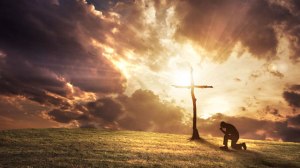I love hymns. They capture profound truth in just a few words and they possess the beauty and wonder of God. They bring reverence and worship to Him and put us in perspective with Him. Hymns focus our hearts and our minds on God. Be Thou my Vision is one such hymn that accomplishes all of these things and more.
The hymn was written by Dallan Forgaill. In 433 AD, it was the time of the Spring Equinox (and the night before Easter), and High King Leoghaire mac Neill had ordered that no fires be lit until the fire on Tara Hill was set ablaze. However, St. Patrick, in a churchyard ontop of the Hill of Slane opposite of Tara, lighted a small candle in celebration of the Resurrection and thereby defyied the kings decree. The High King, instead of executing St. Patrick for his defiance, admired his courage and allowed St. Patrick to continue his missionary work in Ireland.
In honor for St. Patrick’s loyalty towards God, the 6th century monk Dallan Forgaill wrote the Irish poem. In 1905, the poem was translated to English by Mary E. Barne, and in 1912 Eleanor Hull made the translation into verse. The verse was then arranged into song by Leopold Dix in 1919 using an ancient Irish tune called Slane, and has been sung in churches even to now.*
I think many forget the depth of such expressions that a hymn possesses. Yes they are words set on paper, but they are more than that. The words are set into verse, and the verse has a rhythm and precision of sound placement. They flow in a certain pattern and pattern leads into stanzas.
It does not end there. St. Patrick is a wordsmith, giving weight and meaning to each word. Understanding the depth of each verse brings a richness to the poem. The first stanza speaks of the Vision, that Great Thought, that penetrates our mind all day and night. The second verse speaks of the Father, the Son, and the Holy Spirit, and how we intimately relate to each one. The third speaks of that Vision as our source of strength in the time of battle, our armor and our refuge. The fourth speaks of our God as our treasure and inheritance, all that we truly own and all we truly need, now and forever. The fifth stanza speaks of our Lord who has already obtained victory, and how we will one day reach Heaven’s shores to see the Great Light face to face. It speaks of our continued hope, and the plea that no matter what happens, may He still be our Vision.
To those who understand these words, it brings delight and joy to the spirit. But it does not end there. Added to these words is music. A tune that is ancient and, dare I say, magical. The music adds another dimension to the poem. Its what makes the poem a hymn The music has a theme that rises and falls with each verse. It can be triumphant or it can be solemn. It can be sweet, or it can be reverent. It has a cadence that delights the ears, and it has key that demands to be sung. The voice brings life to the words and our recital of it is a pathway to the heart of God.
But adding music does not complete it. Emotion is then put into the song. Usually music and emotion walk along hand in hand. Indeed, music and emotion can hardly be separated! In our times of trial and pleading or in our times of laughter, we can feel the truth of these words. And that truth compels us to worship with all of our being.
But there is yet another dimension. Singing this hymn with our brothers and sisters, with the body of Christ, brings the song into fruition. To hear the voices of sinners who are broken, diverse in all of our different cultures and languages, and who have all been saved by the grace of our Lord, truly brings me to tears. We are to unite our voices into one, and in doing so taking part in our sanctification. When we together sing, it becomes a glimpse into heaven.
Can I truly describe this hymn? Alas, I’m afraid I cannot. I feel the words will have to sing for themselves. I sing this in both my darkest hours and in the light of my joy. I sing it in the company of others and I sing while alone. I will continue to sing this until I reach Heaven’s shores, and then I will continue to sing still. My Lord, forever be Thou my Vision!
Be Thou my Vision, O Lord of my heart;
Naught be all else to me, save that Thou art.
Thou my best Thought, by day or by night,
Waking or sleeping, Thy presence my light.
Be Thou my Wisdom, and Thou my true Word;
I ever with Thee and Thou with me, Lord;
Thou my great Father, I Thy true son;
Thou in me dwelling, and I with Thee one.
Be Thou my battle Shield, Sword for the fight;
Be Thou my Dignity, Thou my Delight;
Thou my soul’s Shelter, Thou my high Tower:
Raise Thou me heavenward, O Power of my power.
Riches I heed not, nor man’s empty praise,
Thou mine Inheritance, now and always:
Thou and Thou only, first in my heart,
High King of Heaven, my Treasure Thou art.
High King of Heaven, my victory won,
May I reach Heaven’s joys, O bright Heaven’s Sun!
Heart of my own heart, whatever befall,
Still be my Vision, O Ruler of all.
____________
Sarah Mccabe. “Be Thou My Vision”: The History of a Christian Hymn; https://suite.io/sarah-mccabe/3q652dy
